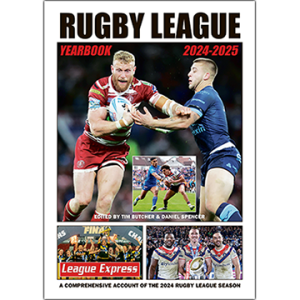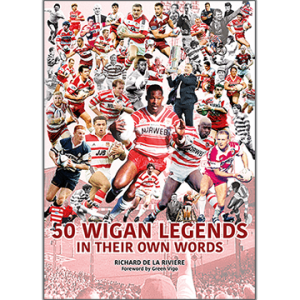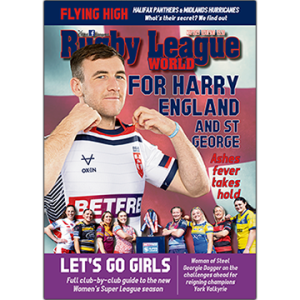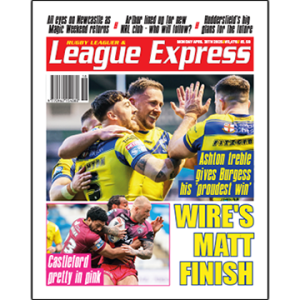
The phrase “much travelled” used to accompany most Norman Turley articles, which is little surprise, given that he played for Warrington, Blackpool (four times, including twice in their Trafford Borough guise), Rochdale, Swinton, Runcorn, Barrow, Workington and Whitehaven.
He kicked a career-record 97 drop-goals. He coached his home town Leigh. He has two sons that Rugby League fans will be familiar with – Neil, who scored tries galore for Leigh, and Warren, who was one of the reserve officials for the Challenge Cup Final at Tottenham.
If you could relive one day from your career, which would it be?
Making my full debut for Warrington after a couple of substitute appearances. I hadn’t been selected for a Floodlit Trophy game. I got home from work and got a call to say Derek Whitehead had pulled out, and I was needed to play fullback. Alex Murphy was coach and my hero. Three years earlier, I’d been cheering him on at Wembley as a big Leigh fan. That was such a famous day, and I was at the parade afterwards. Here I was playing for him and alongside him. It was against New Hunslet. I scored a try and kicked six goals. Everything went so well and I couldn’t believe it.
How had you ended up at Warrington?
I live in Leigh and bumped into Kevin Ashcroft, another of my heroes from 1971. He asked me what I was doing the following year. I’d been at Wigan Under-18s, but it had folded, and he invited me along to play for Warrington. He offered to take me training every day. The highlights were just getting into the first team and playing alongside the likes of Tommy Martyn, John Bevan and many others whom I was in awe of. I was a reserve, mainly because Derek Whitehead was the fullback, but I did once score a hat-trick against Castleford in 1976. They had Mal Reilly and Bruce Burton, who was a brilliant stand-off.
You played a lot of fullback and back row, which is unusual. Which did you prefer?
I played centre in the Colts at Wigan and Warrington. Then I shot up to six feet three and moved to the second row. Tommy Grainey and Lenny McIntyre guided me through the ranks at Warrington and Tommy suggested I have a go at fullback, because even though I was tall, I was 12 stone wet through. I enjoyed fullback, although I didn’t have the pace. I was a steady fullback, but not a flyer like others.
Why did you join Blackpool Borough?
I wasn’t looking to leave Warrington, but Albert Fearnley, who had just taken over at Blackpool, telephoned me. He’d been a top coach in the ‘60s and ‘70s. He mentioned a few players he’d signed, and I agreed to sign. It happened so quickly. I played loose forward. I just wanted to play first-team rugby on a regular basis.
Your halfback was Bak Diabira. What was he like?
He was a fantastic little footballer. He was an old-fashioned scrum-half with a lovely pair of hands. He guided us through and gave us some great advice. He took some clobberings, though. Scrummaging was so important then. If you had a good seven, eight and nine, then you had a chance, and we had a great nine in Peter Clarke. Bak was up there with the best of them and we won so many scrums.
Blackpool provided the opposition for the Australians on the first match of their 1978 tour. You kicked a drop-goal in a 39-1 defeat. Tell us more.
In those days, if the Chairman of the Rugby League was affiliated to any club, they would host the opening game of the Kangaroo Tour, so we got the opening game because of Reg Parker. I think Australia took a 2-0 or 5-0 lead, but the instruction was always to come away with a point. It was worth it because tries were only worth three points back then. Looking back at that Australia team now, so many went on to be legends like Bob Fulton, Steve Rogers, Les Boyd, Craig Young and Tommy Raudonikis. I look back and pinch myself – did I really play against them?
How did you come to kick so many drop-goals?
I didn’t kick any at Warrington because there were other kickers. But at Blackpool, I was the main kicker. The idea was, “We’re not a great side, so let’s come away with something, and get the ball back.” Against all odds, we got promoted in 1978-79. We were 5-3 up at half-time at Keighley in one game, and it was five drop-goals. We beat them, and that’s all that matters. It was £30 for a win back then and an extra quid for a consecutive win, and we wanted it. We kicked 42 that season – I got 18, and Alan Fairhurst got 16.
Why did you join Rochdale Hornets?
Blackpool didn’t have a squad together for the top division, and I didn’t fancy getting flogged on a weekly basis. We were on winning or losing money, and I didn’t think we were going to win many games. The directors seemed to believe the same players could do well in Division One. I regret it a bit because maybe I should have stuck it out.
Paul Longstaff was the first-team coach at Rochdale. They had some giants like local hero Brett Garside at six feet five. Sean Hoare was even taller at six seven. I was the shortest backrower at six three. I was also the ‘A’ Team coach at Rochdale. I gave it a good go, but it was hard because I was still playing and training with the first team.
You went on loan to Swinton in 81-82. Did you get to know the likes of Green Vigo, Danny Wilson and Alva Drummond?
Everyone got to know Danny Wilson! He was a real character on and off the field. He had so much talent. Jai Field reminds me of him. Tommy Grainey was the coach, and he took me there. We played in the semi-final of the John Player Trophy at Headingley against Hull KR, which was a big deal, but we lost 23-14. A permanent move didn’t happen, sadly, so I went back to Blackpool. Tommy Dickens had taken over, and he offered me the job of assistant coach and playing. We were quite competitive in the old second division. Hugh Waddell came along. He’d travelled up from Stoke, knocked on the door of the club, having never played Rugby League, and he slotted in nicely. He achieved a lot more than I thought he would. He got on the Lions Tour in 1988, and it all came from knocking on that door and asking for a trial.
Your next stop was a brief sojourn at Runcorn at the start of the 1985-86 season.
I was in no man’s land, keeping fit at Leigh Miners but looking for another club. Geoff Fletcher rang me up, and I signed a month’s contract with Runcorn. A Barrow director called me, and they had real ambitions to get promoted. Geoff wasn’t having it, and he held me to my word. “You’ve signed for a month, and you’re f***ing staying for a month!” So I did the honourable thing, and then I left for Barrow.
Ivor Kelland was the coach there, and he had a very good side with Dave Cairns and Steve Tickle the backbone. We beat Leeds in the John Player and we got promoted. Kevin Hastings (Jackson’s dad) had joined us from Easts. Ivor told me he wanted to build a team around Kevin and that Workington wanted me as player-coach.
How difficult was the role of player-coach?
I travelled up three or four times a week, which wasn’t easy, but opportunities like that don’t come up often, and I don’t regret taking it. We had a good start to the season, winning ten out of 13. We were top of the league, but I got a serious back injury. I was in hospital for three weeks. I’d taken Ray Tabern up there to play, and he took over the coaching while I recovered. I’d signed for one year with the option of a second, but the club didn’t take it up.
Your next club was Trafford Borough, which was the old Blackpool club in a new location.
My old team-mate Mike Peers signed me when I’d got over the back injury. Bob Eccles and his brother Cliff came along. Darren Abram too. We had a good little squad and a nice set-up at Altrincham FC. Whitehaven then offered me their player-coach job. I felt I had something to prove in West Cumbria because of how I’d left Workington. I had a season and a half there, and I enjoyed both the coaching and the playing. But there was a lack of funds, and it was difficult to get players to travel there. I’d be up at 7am and finish on the building site at 3, head to Cumbria, train, chat to the directors, get home at 1.30am and then be up at 7 again to go bricklaying. But I wouldn’t change a thing – I liked a lot more than I disliked.
I went back to Trafford for another spell, which was probably a mistake. I thought I owed them a favour, but we got some good hidings. We were struggling to get players to the club. We were using players who were playing amateur on the Saturday and then for us on Sundays. You can’t get away with that. St Helens put 100 on us and Huddersfield scored 70 against us twice.
You later coached Leigh and were assistant coach when they won promotion to Super League in 2004 when your son Neil was the star player.
When I was head coach in 1998, the players were on £110 a win, and £30 for a loss. There were players in Super League earning more than the entire Leigh team would have done even if they’d won every single game. Those lads had some serious dedication.
I was later assistant to Ian Millward and then Paul Terzis. We signed Neil from Wigan. We’d also got Simon Svabic from Salford, and he was due to be the fullback. We played a touring South Sydney Rabbitohs team, and Simon had to pull out. Neil came in and did really well. He then scored a hat-trick against Swinton and went on to score 55 tries in 2001. It was incredible.
I was interim coach a couple of times. We won the 2004 Grand Final, and I stayed on the staff for the 2005 Super League season. I was so proud to coach at Leigh. I was born and bred on a council estate 500 yards from Hilton Park. I used to sell programmes on matchdays. I needed to be an octopus because people swarmed all over you. I drive past with the grandkids now, and I tell them where I stood selling programmes. They say, “Okay grandad, you told us that yesterday. And the day before.” Happy days!
The above content is also available in the regular weekly edition of League Express, on newsstands every Monday in the UK and as a digital download. Click here for more details.




